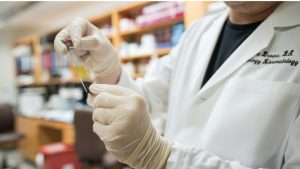
The NIH Accelerating Medicines Partnership, in collaboration with the Foundation, has released its first RA and SLE datasets.
The Rheumatology Research Foundation has been actively involved with the NIH’s Accelerating Medicines Partnership for Rheumatoid Arthritis and Systemic Lupus Erythematosus (AMP RA/SLE) program, launched in 2014 as a public–private partnership to spur development of new therapeutic options for RA and lupus. Recently, the NIH released new datasets that will help clinical investigators accelerate therapies for rheumatoid arthritis (RA) and lupus.
Scientists across the biomedical research community can access this important biomedical resource to inform research questions about these autoimmune conditions. Availability of the data expands the search for genes, proteins, biological pathways and other factors that influence these conditions. Researchers mining the data can seek to identify treatment targets to develop medicines for diseases of interest. The data also has potential implications for precision medicine, as AMP RA/SLE researchers identify differences in the pathways active in the tissue of different patients.
“This pioneering program seeks to speed the development of new ways to combat a range of devastating diseases that affect millions of people,” said NIH Director Francis Collins, MD, PhD. “AMP RA/SLE is entering an exciting phase as experts around the world will begin to mine this invaluable biomedical resource in search of tomorrow’s cures.”
This study used state-of-the-art technologies to analyze individual cells from the lining of the joints in people with rheumatoid arthritis and the kidneys from people with lupus from research cohorts whose clinical characteristics were well studied. Other research tools tend to examine signals from across populations of cells, and in the process may miss important factors coming from only a few individual cells. By focusing on single cells, researchers can tease out the contributions of specific pathways inside these cells that may play a role in disease, providing a new approach to understanding autoimmunity.
Collaborative efforts, such as AMP RA/SLE, exemplify the Foundation’s commitment to pursuing dramatic advances in the diagnosis and treatment of rheumatic diseases and supporting high-quality, innovative research conducted by the best and brightest investigators. The AMP RA/SLE investigators are currently conducting Phase II studies, which will include a larger cohort of patients with RA and lupus. The Phase I data are freely available through the NIAID-sponsored Immunology Database and Analysis Portal.
